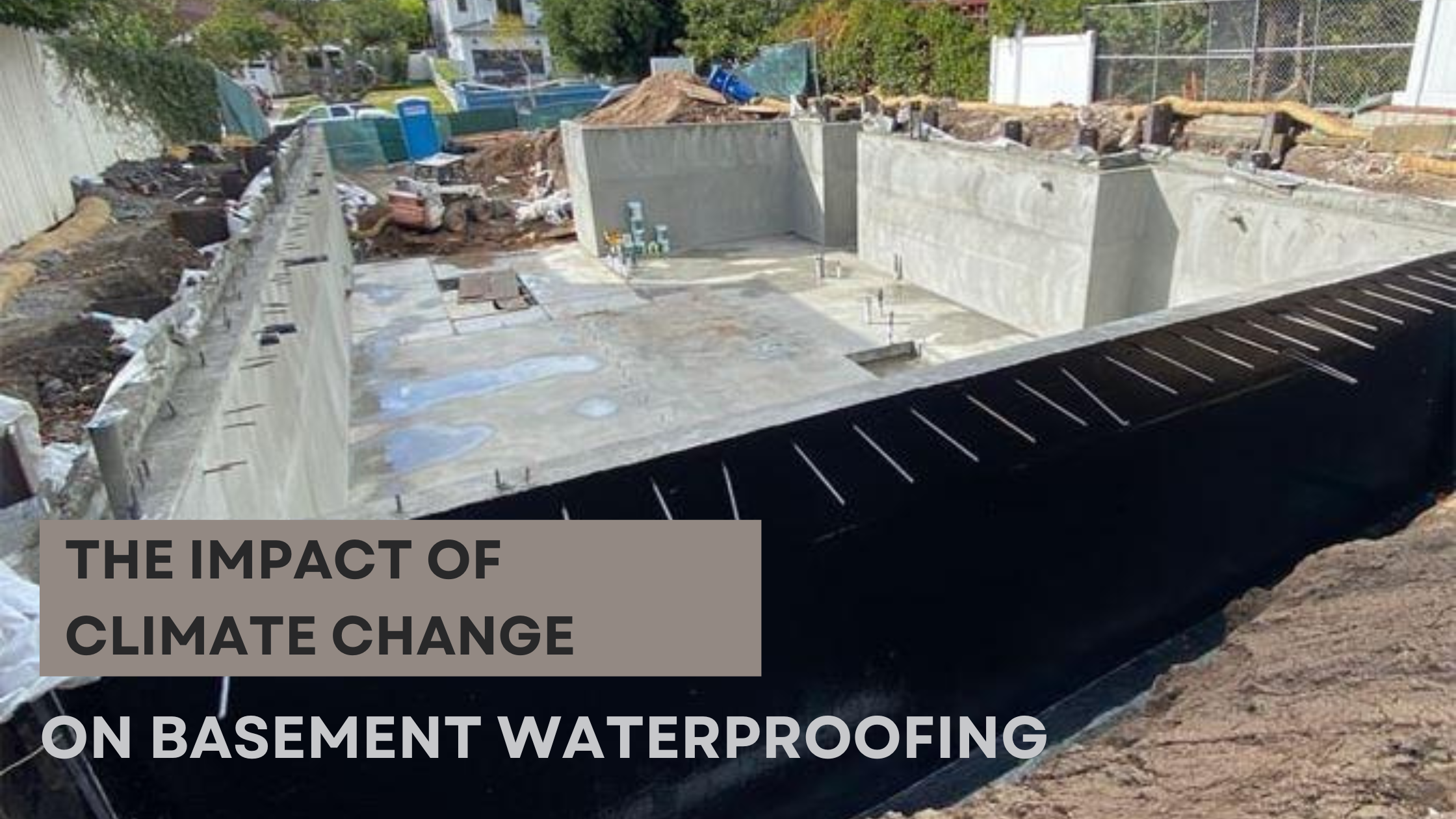Climate change is a global phenomenon that has far-reaching implications for various aspects of our lives, including the structural integrity of our homes. While we often associate climate change with rising temperatures and extreme weather events, its effects can also significantly impact the infrastructure beneath our homes. One area that faces increasing challenges due to climate change is basement waterproofing. As precipitation patterns shift, groundwater levels rise, and freeze-thaw cycles become more erratic. Basements are becoming more vulnerable to water damage and flooding. In this article, we will delve into the impact of climate change on basement waterproofing. We will also discuss effective strategies to adapt to these evolving challenges. By understanding these impacts and implementing appropriate preventive measures, homeowners can protect their basements from water intrusion and maintain the long-term stability of their homes.
Precipitation and Basement Flooding
Climate change has led to shifts in precipitation patterns, with many regions experiencing more frequent and intense rainfall events. According to a study by the National Oceanic and Atmospheric Administration (NOAA), extreme precipitation events have increased in the United States by over 30% since the mid-20th century. This rise in precipitation poses a significant threat to basements, as excess water can infiltrate foundation walls and cause flooding.
Rising Groundwater Levels and Hydrostatic Pressure
Another consequence of climate change is the rise in groundwater levels. As temperatures increase, glaciers melt, and precipitation patterns change, groundwater tables can become elevated. This rise in groundwater levels can lead to increased hydrostatic pressure on basement walls and floors. Over time, this pressure can compromise the structural integrity of the basement and result in water seepage.
Changing Freeze-Thaw Cycles and Foundation Cracks
In regions where freeze-thaw cycles occur, climate change can disrupt this delicate balance. As temperatures fluctuate more dramatically, the freeze-thaw cycles become less predictable, leading to more frequent and severe frost heave. Frost heave can exert tremendous pressure on foundation walls. It can also cause cracks and openings that allow water to seep into the basement.
Adaptation Strategies for Basement Waterproofing
Proper Exterior Drainage Systems
Installing and maintaining effective exterior drainage systems, such as French drains or gutter systems, can help divert water away from the foundation. Regular inspections and maintenance of these systems are essential to ensure their optimal functioning.
Foundation Waterproofing
Applying waterproof coatings or membranes to the exterior of the foundation walls can provide an additional layer of protection against moisture intrusion. These products create a barrier that prevents water from seeping into the basement.
Sump Pump Installation
Installing a sump pump with a battery backup system is crucial for preventing basement flooding during power outages or when heavy rainfall overwhelms the existing drainage systems. Regular maintenance and testing of the sump pump are essential to ensure its reliability.
Interior Drainage Systems
Interior drainage systems, such as French drains or a perimeter drain tile system, can effectively manage water that enters the basement. These systems collect water and direct it towards a sump pump or a drainage outlet, preventing water from pooling in the basement.
Regular Maintenance and Inspections
Conducting routine inspections of the basement, checking for signs of water damage or cracks. Prromptly addressing any issues can help mitigate potential water intrusion problems. It is advisable to seek professional assistance for comprehensive inspections.
When to Call a Professional
While there are several do-it-yourself approaches to basement waterproofing, some situations require the expertise of a professional. Here are some instances when it is advisable to call a professional:
Severe Water Damage
If your basement has experienced significant water damage, such as extensive flooding or mold growth, it is crucial to enlist the help of a professional waterproofing contractor. They can assess the extent of the damage, identify the underlying causes, and provide effective solutions.
Persistent Water Seepage
If you notice persistent water seepage or dampness in your basement, despite your best efforts to address the issue, it is time to consult a professional. They can perform a thorough inspection to identify the source of the problem and recommend appropriate measures to resolve it.
Foundation Cracks
Cracks in the foundation walls or floors can be a sign of structural issues that require immediate attention. A professional waterproofing contractor will have the expertise to assess the severity of the cracks. They will also provide solutions to repair and prevent further water intrusion.
Complex Waterproofing Systems
For homes with complex waterproofing systems, such as multiple sump pumps, interior drainage systems, or advanced exterior waterproofing methods, it is advisable to seek professional assistance. They have the knowledge and experience to install, maintain, and troubleshoot these systems effectively.
New Construction
If you are building a new home or planning a basement renovation, involving a professional waterproofing contractor from the early stages is crucial. They can provide expert guidance on the best waterproofing strategies. And can also ensure that your basement remains protected from water damage in the long run.
Insurance Claims
In cases where you need to file an insurance claim for basement water damage, it is beneficial to have a professional waterproofing contractor assess and document the extent of the damage. Their expertise and detailed reports can help strengthen your claim and ensure proper compensation.
Conclusion
As climate change continues to impact our environment, the challenges associated with basement waterproofing are likely to increase. By understanding the implications of climate change and implementing appropriate adaptation strategies, homeowners can protect their basements from water damage and ensure the long-term integrity of their homes. Prioritizing preventive measures, regular maintenance, and seeking professional guidance can go a long way in safeguarding basements from the effects of climate change.
While some basement waterproofing tasks can be handled by homeowners, certain situations necessitate the involvement of a professional waterproofing contractor. Severe water damage, persistent water seepage, foundation cracks, complex systems, new construction, and insurance claims are all scenarios where professional assistance is recommended. Remember that timely intervention and expert advice can help mitigate potential risks and ensure effective solutions for basement waterproofing.
